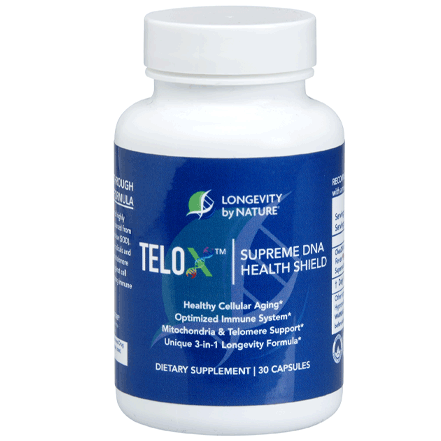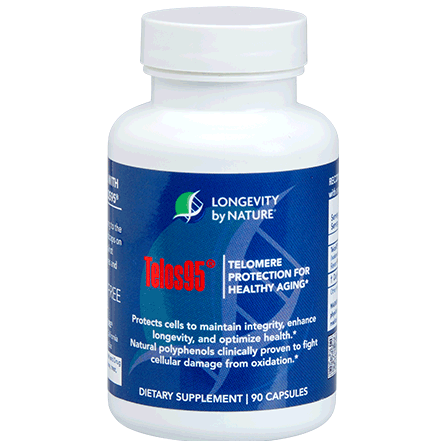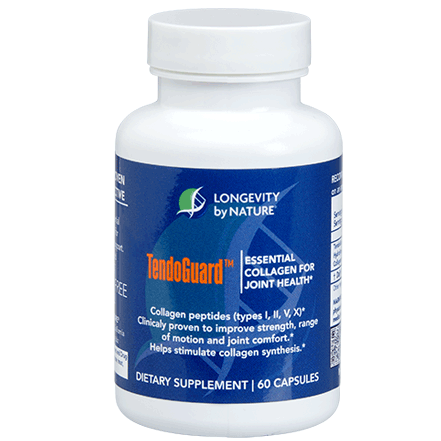As we age, our bodies go through several changes. Some of these changes can be very obvious, while some are microscopic.
One of the most impactful changes that we go through happens on a cellular level. This change is the shortening of our telomeres. While telomere shortening is a natural occurrence in the aging process, there are lifestyle changes we can make to slow progression and even increase telomere length.
Adding Telos95 by Longevity By Nature to your daily routine is clinically proven to promote telomere health, cellular longevity, and protect against cell senescence. Lengthen your telomeres in as little as 6 months and slow down the aging process of your healthy cells with our telomerase supplement.
What are telomeres?
Telomeres are sequences of repetitive DNA that act as a buffer on the ends of our chromosomes, capping them and protecting them from damage. As we get older, the telomeres shorten in length at variable speeds based upon several factors such as how we eat, how active we are, stress, genetics, and a myriad of other influences. When telomeres reach a critical level, cell senescence begins and we are prone to age-related diseases such as Alzheimer’s along with cancer, diabetes, and other illnesses.
What is Alzheimer’s disease?
Even minor modifications to our DNA can lead to negative consequences, including age-related diseases such as Alzheimer’s. Alzheimer’s is a degenerative condition characterized by an abundance of abnormal protein deposits that cause the deterioration of brain cells and a reduction in brain size. These subsequent changes ultimately cause memory loss, behavioral changes, communication difficulties, and other difficult symptoms. As Alzheimer’s disease advances, individuals may eventually struggle with even basic tasks such as eating, cleaning, and maintaining personal hygiene. Over time, many affected individuals reach a point where they are no longer able to recognize their closest loved ones.
While genetics are thought to contribute to some cases of Alzheimer’s disease, other environmental and lifestyle factors can potentially play a big role in the development and progression of the disease.
What is the connection between telomere shortening and Alzheimer’s disease?
Since telomeres are thought to be the most accurate marker of biological age, naturally, shorter telomeres can be linked to cognitive decline, age-related diseases, and degenerative conditions such as Alzheimer’s.
Over time, the shortening of telomeres leaves cells unable to divide, multiply, or function efficiently. These first signs of cellular death can result in cellular aging and damage to tissues. This damage eventually leads to complete cellular senescence. Senescent cells are cells that have stopped dividing and are no longer functioning in the same way as they did before. This change, over a prolonged period, can contribute to Alzheimer’s and other age-related conditions.
Studies that have found a link between telomere shortening and Alzheimer’s disease
Researchers from the UConn School of Medicine have corroborated a link between shorter telomeres and a higher risk of developing Alzheimer’s disease and other age-related dementias. This recent study monitored over 43,000 participants of European descent, carefully assessed their telomere lengths in their mid-life years, and monitored their development of Alzheimer’s disease and/or dementia over the course of 12 years.
Not surprisingly, their findings show that shorter telomeres are indeed associated with a greater risk of developing Alzheimer’s. Additional research is on the horizon to gain even more insights into the role of shortening telomeres by continuing to track the participants in the study as they continue to age.
How telomere shortening may contribute to the development of Alzheimer’s disease
As telomeres become shorter, it ignites a response within our DNA that prevents cells from growing and functioning normally. This response allows our cells the chance to stop and repair any damage that may be occurring. However, as our telomeres reach critical lengths, the cells either stop dividing or die off altogether. This cellular senescence wreaks all kinds of havoc within our bodies including inflammation, infection, cancer, diabetes, Alzheimer’s, and more.
The role of telomerase in telomere maintenance
While telomere shortening is a natural part of aging, our bodies do have their own sort of defensive line. Telomerase is a restorative enzyme that can actually halt the progression of telomere shortening as it works to protect the integrity of the ends of chromosomes, which in turn, allows a longer telomere lifespan. Decreased telomerase activity is directly associated with cell senescence or the longevity of cellular replication.
Potential supplements that may help to lengthen telomeres
Although our body can miraculously work to fight shortening telomere lengths, telomere shortening is inevitable. However, there are longevity supplements such as Telos95 that can slow progression, and even lengthen telomeres in as little as six months.
Naturally derived from olive leaf and grapevine, Telos95 offers a way for you to slow down the natural telomere-shortening process and fight the signs of aging. The nutrients in Telos95 also work to boost energy, strengthen the immune system, and fight fatigue, so you can feel better, for longer.
Closing thoughts
Although further research is needed regarding the link between telomeres and Alzheimer’s disease, there has been a scientific awakening in recent years regarding the effects of telomere length in general. We expect to see more and more corroborating information in the near future. This information is likely to assist in developing strategies to prevent and treat this devastating disease. Although there are not currently any available treatments for Alzheimer’s disease, there are preventative measures that can be taken.
It is now known more than ever that maintaining telomere length is crucial in degenerative disease prevention. Along with taking a telomere lengthening supplement, there are several lifestyle components that you can improve to contribute to telomere longevity. This includes eating a healthy and well-rounded diet, exercising, sleeping well, and leading a life that is as stress-free as possible.
Discover Telos95 Telomere Supplement
At Longevity By Nature, we proudly provide our customers with 100% natural, plant-based, USA-made, FDA-compliant supplements like Telos95. With Telos95, you can fight telomere shortening and slow down the aging process of your body’s healthy cells! A daily dosage of 95mg has been clinically shown to lengthen your telomeres in just six months and decrease your cellular age by an average of 7.42 years.
Explore more best selling supplements from Longevity by Nature
Related Blog Posts
- What are Telomeres?
- Tips to Protect Against DNA Damage
- How Can I Boost DNA Repair Naturally?
- What are “Zombie Cells” & Their Role in Aging?
- Why Do We Lose Telomeres as We Age?
- How to Protect Your Telomeres & Increase Longevity
- Why Do Telomeres Shorten With Age?
- Why is Telomere Length Important in Aging?
- Tips to Slow Down Telomere Shortening
- Tips to Slow Down Cellular Aging







